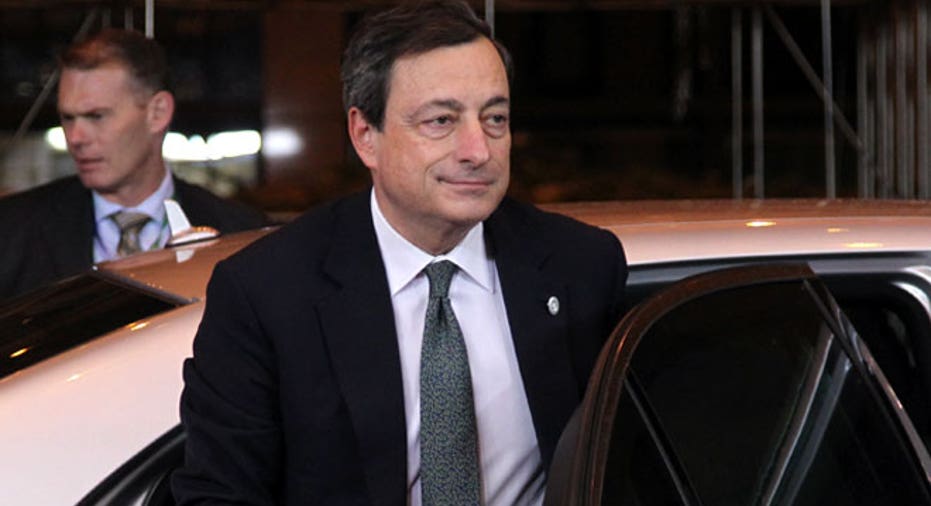Draghi to the Rescue: Emergency ECB Moves Ease Eurozone Crisis

If President Obama wanted to thank someone for the relative calm in Europe that is buoying U.S. equity markets, perhaps he should consider an Italian economist few Americans have ever heard of.
That’s because the extraordinary actions taken by Mario Draghi and his colleagues at the European Central Bank two months ago today have successfully yanked the eurozone back from the precipice of a banking crisis.
Somewhat belatedly, Draghi is beginning to get credit for two moves in particular, both of which could have been taken out of Ben Bernanke’s 2008 playbook: a virtually unlimited three-year loan facility and increasing the amount of collateral banks can post with the ECB.
Draghi Buys Breathing Room
The lending program, which bankers call a long-term repo operation, “has been the eurozone’s silent bazooka,” said Jan Randolph, director of sovereign risk at IHS Global Insight. “It hugely calmed fears in the banking markets that there would be a bank toppling over because of a liquidity crunch.”
By easing jitters of a Lehman-like event in Europe, global financial markets rallied and the U.S. economy appears to have picked up steam, boosting the reelection hopes of Obama. On the heels of a very bullish January jobs report, the Dow landed on Tuesday at levels unseen since May 2008.
The emergency actions orchestrated by Draghi won’t solve the difficult structural issues facing the eurozone or fix the troubled assets on bank balance sheets. But it did give policymakers some breathing room to solve those delicate issues.
“The apparent success of the ECB’s 3-year LTRO has bought precious time by dampening the adverse feedback loop between peripheral government bond markets and banking system,” Jan Hatzius, chief U.S. economist at Goldman Sachs (NYSE:GS), wrote in a note on Monday.
Before Draghi announced the moves two months ago, the European banking markets were beginning to freeze up, similar to the atmosphere in the fall of 2008 in the U.S.. This was displayed by a rise in Libor rates, which act like the credit markets’ fear gauge.
European banks saddled with the risky debt of troubled eurozone nations like Portugal and Greece began to have trouble accessing the short-term borrowing markets they rely on.
Fears Recede...For Now
The three-year lending facility, which lets banks borrow from the ECB for just 1%, “has unclogged many of the difficulties in the markets” and acted as a “huge lifeline for all sorts of banks,” said Randolph.
Marc Chandler, global head of currency strategy at Brown Brothers Harriman, said not to overlook the value of the ECB loosening up its collateral rules.
“Many market observers belatedly now recognize the significance of the LTRO, but few appear to have understood how important the liberalization of the collateral rules are to allow access to the LTRO and other ECB funding,” Chandler wrote in a research note. “They are interesting separately, but the real import is in the combination.”
Combined, the programs have eased the refinancing burden that European banks were facing in 2012, giving them time to rebuild their capital.
The cost to insure the sovereign debt of virtually every eurozone country except Portugal, which had its ratings cut to junk territory, has retreated since the December 8 ECB emergency actions.
For example, the price to insure $10 million of Spanish bonds has slid 19% to $347,000, while the cost to insure Italian debt has dropped 28% to $377,000, according to Markit. The decline in Belgium was even more dramatic, tumbling 35% to $207,000.
Likewise, insurance contracts for lenders with exposure to eurozone debt has fallen. The cost to insure $10 million of debt from French banking giant Societe Generale plunged 47% to $229,000 from a crisis peak in late November of $435,000. Likewise, Morgan Stanley's (NYSE:MS) insurance costs have slumped 51% from their highs in late November to $248,000.
Bernanke, Euro-style?
The positive effects of the ECB actions may actually increase because more banks are expected to try to tap the LTRO as the stigma associated with program seems to have diminished.
Since becoming ECB president last November, Draghi, a former Goldman Sachs (NYSE:GS) vice chairman, has acted much more aggressively than his predecessor, Jean-Claude Trichet.
Draghi wisely forecasted the eurozone would slip into a recession back in October, paving the way for the emergency actions he took when he took over. He also reversed Trichet’s questionable decision to raise interest rates last year.
Randolph said he would rate Draghi’s job performance an 8 or 9 out of 10 so far and compared him with Bernanke, who is credited by many for helping to prevent a collapse of the U.S. financial system.



















